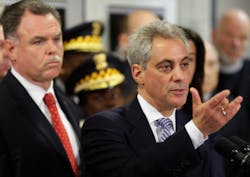Chicago Police Officials Tout Drop in Homicides
Six months after Chicago ended a bloody 2012 with more than 500 slayings, police Superintendent Garry McCarthy on Monday delivered some encouraging news about the homicide number: It's at its lowest total in nearly half a century.
"To date, we've had fewer shootings than we had in recent years, and fewer murders than in any year since 1965," McCarthy said during a news conference at a West Side police station.
That number of slayings, 184, is the lowest total Chicago police have reported to the FBI for the first half of a year since reporting 180 in 1965, according to official Police Department statistics.
But internal department data obtained by the Tribune show an identical number of people were slain in Chicago during the first six months of 2013 and 2011 -- 188.
The difference between the figures is that the official Chicago police tally to the FBI did not include four killings -- at least three of which took place within city limits on expressways patrolled by the state police. The comparable figure for the first half of 2011 could not be tabulated.
At the news conference, McCarthy touted a sharp drop in slayings in the first half of 2013 compared with the same period last year. Much of the first half of 2012 saw unseasonable warmth in the city -- and a sharp rise in violence that drew national attention.
Through the first six months of 2013, homicides decreased by close to 30 percent compared with a year ago. Shootings also dropped by about 25 percent.
However, the progress slowed in June. According to the internal data obtained by the Tribune, homicides fell to 45 from 48 a year earlier.
In addition to a colder winter in 2013, many within the department credit the decrease in homicides and shootings over the first half to the department's overtime initiative that at one time allowed more than 400 officers to work on their days off in the most dangerous areas of the city.
But McCarthy believes there's a number of factors that account for the drop in violence.
"It's the intelligent crime strategies where we're putting the officers in the right places at the right time. It's giving the (district) commander the tools to do it," he said. "Probably the most significant thing is the amount of gang intelligence that we've collected and collated."
Copyright 2013 - Chicago Tribune
McClatchy-Tribune News Service
